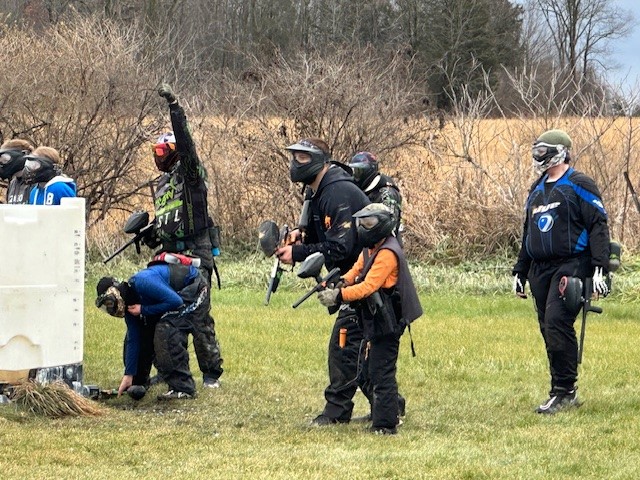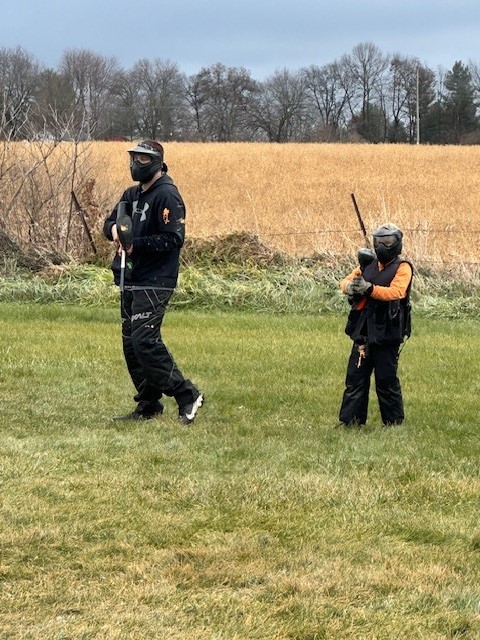Strategy, Planning, Execution: Paintball & Business
- Blog Strategy, Planning, Execution: Paintball & Business
This weekend I had the opportunity to be part of my wife’s family reunion. The South came to Wisconsin for a wonderful weekend of food, fellowship, and paintball. Yep! The family that shoots each other stays together. No that is not how the expression goes but it worked for us. I learned several things while playing paintball this weekend. First, I am terrible at it. Second, it requires a lot more skill than just shooting paintballs out of your gun. You must be strategic, plan your moves carefully and execution will depend on your tools, or you will not be successful.
OMG, that is just like running a business!
STRATEGY
Each team is placed at opposite sides. You have a team of 5-10 people. The ref starts the clock and you have an opportunity to shoot each other. The team with the most players still playing when the time is up wins. I was with several teams for six matches, and I saw a lot. There are some players that have tons of experience, and you have guys like me that have no idea what they are doing. How do you work as a team with a wide variety of experience? The team does their own thing individually or you work together. No one is a captain, but I saw leaders show up. I was standing in the back middle when a guy I had never met, who knows with masks on, asked if I would want to stay back and he would move forward. We worked out a system, so we knew who was going to what role and understand where each player was going. I saw others do their own individual plan. That worked out till everyone got taken out and they were left alone. The odds of five players vs. one is not a good strategy. The game was stopped to show mercy to that one player. I learned that the team that works together with a plan is the one that will win!

PLANNING YOUR MOVES
My youngest son was able to play paintball for the first time. My wife’s nephew, Taylor, is a paintball warrior, so he offered to take my son under his watch. It was so cool to watch Taylor protect my son and teach him how to stay low, shoot carefully and told him when to move forward or stay back. My son trusted his cousin instantly because he knew he was in a situation that required a guide. Our employees need to be able to trust its leaders especially when they don’t know what the next move should be. A good leader communicates well and often. My nephew could have let my son alone to do his own agenda, but he didn’t. They moved together and were in sync. Clear instructions were given before execution was made. That is how business should be when we are leading teams or one person. Don’t give up the plan and do your own thing. My son was left alone when my nephew got hit with the paintball, but he didn’t panic. He knew what to do because he had been taught with clear direction. That was so cool to watch my son grow in that moment and find success without letting fear take him out.


EXECUTION
“Everyone has a plan till they get punched in the mouth (Mike Tyson).” I had a strategy, planned my moves, and failed on my execution during my paintball battles. Yep, I can honestly say that I failed before I even started by wearing the wrong pants. They were too big which caused me to not be able to move quickly. I was done before I even got started. Next time, if there is one, I will be wearing the right clothes. The other issue was my gun did not work properly. As my dad always said, “It is not your fault but it is your problem!” I tried to shoot but nothing came out. The gun was jammed and would not shoot the paintballs. I didn’t realize that till after the game was over. Do you ever wonder in business why your efforts are not making results happen? Maybe you have the wrong tools like me?! Take time to examine your results and be sure to ask questions on why you are not getting the results you want. “Hope is not a strategy, and no one drifts into excellence (Steve Scherer).”
In conclusion, I am so glad my wife’s nephew planned this family affair for us. We hope to keep the tradition going. Not sure if it fits for your family but what if? I promise one thing for sure; you will enjoy shooting your family legally. 😊

NEED MORE?
Connect with us on YouTube and LinkedIn for more fun and engaging free content.
Visit our sponsor, CCB Technology, to get your IT fixed.
Related Content




Comments